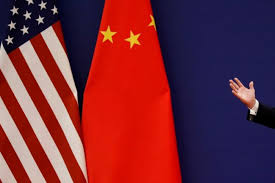Foreign financiers look past the trade war and ramp up in China

AS CHINA WAS preparing to join the World Trade Organisation in 2001, the phrase “the wolves are coming” kept cropping up in state media. The country was about to open up to foreign banks and the fear was that Wall Street’s finest would devour their Chinese rivals. But regulators managed to defang the wolves, never giving them a chance. Today, foreign firms account for less than 2% of assets in China’s banking sector.
It is instructive to keep this in mind as China again talks of opening its financial system. On July 2nd the prime minister, Li Keqiang, said that foreign investors would be allowed to take full ownership of investment banks and insurers in China from 2020, a year earlier than previously promised. Over the past two decades they have been limited to minority shares, and only last year were they permitted 51% stakes.
For foreign financiers the initial reaction is naturally one of scepticism. China still has plenty of ways to slow them down. One investment banker says that rather than rejecting his firm’s application for a majority stake, which might have sparked criticism, regulators simply refused to acknowledge receipt.Nevertheless, there are grounds for cautious optimism. For starters China is under closer scrutiny than in the past. Its rule changes are partly a response to the trade war with America. The government wants to win more support from foreign businesses, which it hopes can rein in America’s tariff-loving president, Donald Trump.
Internationally minded officials also crave more competition in the financial system for China’s own good. As growth slows, they want to improve productivity, which requires better allocation of capital. The government’s recent takeover of Baoshang Bank, an insolvent regional lender, was a reminder of the deep rot in certain corners of the economy.
The long-stymied foreign banks are still minnows compared with China’s state-owned giants, but their assets in the country have increased by 40% in the past two years to almost $ 650bn, a third more than the total in Japan. The investment-banking industry is also starting to be reshaped. HSBC, JPMorgan Chase, Nomura and UBS are all now either operating or setting up majority-controlled investment banks. “The opening appears to us to be more substantial than before,” says Eugene Qian, the head of UBS’s China business. “We have more skin in the game.”
Fund managers are also being drawn into China, often following overseas clients as they invest more money in its markets. According to the Institute of International Finance, a global industry association, since the start of 2018 non-residents have put $ 75bn into Chinese stocks, while withdrawing $ 8bn from other big emerging markets. Foreign ownership of Chinese bonds has more than doubled, to $ 265bn, over the past two years, and analysts expect it to grow roughly five-fold over the coming decade.
One obvious cause for these inflows is index inclusion. Last year China’s A-shares (yuan-denominated shares in the mainland) entered the MSCI emerging-markets index, a popular benchmark. This year Chinese bonds entered their first major index, the Bloomberg Barclays gauge. Taken together, these inclusions compel investors who track indices to allocate billions of dollars to China, even if some are wary of it.
But China is also working harder to attract them. Until recently the only feasible way into its stock and bond markets was through special quotas assigned to large institutions. Now all investors need is a brokerage account in Hong Kong. “Among the emerging markets China does not stand out as being particularly difficult,” says Nicholas Borst of Seafarer Capital Partners, a fund manager in San Francisco.
Still, firms trying to establish themselves in China face a long road. Sectors that require lots of capital and a large physical presence will be tough to crack. No foreign firm can fight for mass-market business in banking when Agricultural Bank of China has more than 20,000 branches, or in insurance when China Life has 1.7m salespeople. But there are lucrative niches such as serving wealthy clients or handling cross-border deals.
Fund managers and investment banks stand more chance because success is determined less by size than by expertise, says Victor Wang of China International Capital Corp, a big domestic brokerage. When it comes to structuring derivatives or offering research, foreigners have more experience. Yet they will also run up against local rivals with bigger names and more clients. “There is no magic way to become competitive in this market,” Mr Wang says.
Meanwhile the trade war looms over all. Some hawks in America want to sever financial ties with China. Marco Rubio, a Republican senator, has challenged MSCI over its inclusion of Chinese shares, accusing it of helping authoritarians. A headhunter in Hong Kong reports that American fund managers slowed their hiring after trade talks between China and America broke down in May. With talks set to resume, they can breathe a sigh of relief—for now. The worry is that, just as China clears away some of the obstacles in their path, America will replace them with new ones. ◼


